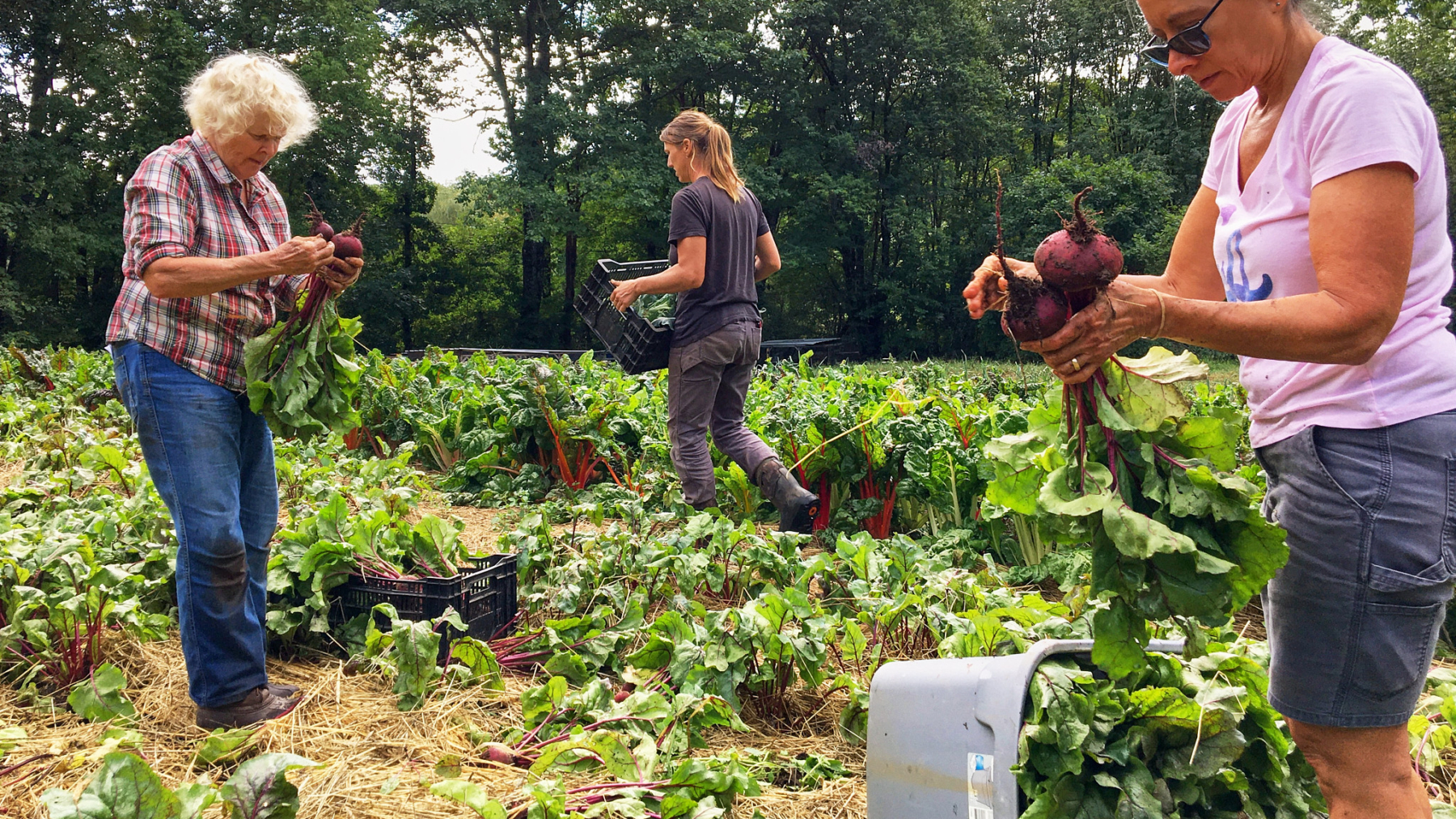About Us

Photo credit: Alexandre Chiacchio. alexandrechiacchio.com/
The Farm
Many Hands Organic Farm has been in existence since 1982 and has been selling to the public since 1985.
The Ideals
Organic farming is broadly defined as a farming system that respects the balance of natural cycles and works as much as possible within those natural cycles.
Practically for us at Many Hands it means that we use foliar nutritional applications, natural rock powders, vegetable meals, crop rotation, heavy mulches, wood chips, and corrugated cardboard, cover crops, and animals in rotation with vegetables and fruits. We extend the season on both ends with the use of unheated hoop houses. Over the past several years we have focused intensively on fertility, using soil tests and enhanced observation to determine fertility needs. We have upped our game to prioritize carbon sequestering methods on our farm and photosynthesis maximization. We use careful mob stocking pasture management, farm-made fungal composts and amendments, living vegetative pathways or heavy mulches between our vegetable beds, use of cover crops pre-season, during the season and in the winter, and now no tillage – we sold the tiller in 2014. In 2019 with the addition of the use of black silage tarps to slowly kill vegetation, we have been able to cut down a lot of the hand work. Redoubling our efforts to keep the soil covered with growing plants throughout the calendar year is a high priority. In 2023 we will be returning to a previous practice of brewing our own fertility and microbial liquids to add to our intricate foliar feeding program. In 2023 we also have added a bale chopper to more easily manage our mulch materials to get them on the fields in an early and efficient fashion. Ask – we are quite voluble on this topic of our chosen management strategies to keep the mycorrhizal fungi happy and at full capacity to manage the underground soil system for maximum photosynthesis! And read Jack’s world renowned “Soil Carbon Restoration: Can Biology Do the Job” here.
The Family
Personnel on our farm used to center around our family labor. We are Jack and Julie and four kids: Dan, Paul, Ellen, and Chuk. Julie and Jack are both recently retired from their non-farm jobs, Julie from NOFA/Mass and Jack from The Natural Farmer. We both are active volunteers in the local music community.
Now in their 40’s, the kids are leading interesting lives. Dan is the executive director of the Bionutrient Food Association, an organization he founded in 2010 which focuses on food quality. He speaks to audiences around the country and world on the topics of nutrient density and principles of biological systems with plenty of content on YouTube for those who may be interested. Earning his living by farming until 2017, his divorce process kept him from his land in North Brookfield from then until just recently. He is looking forward to getting back to the homesteading lifestyle, and has 4 children – Anya, Samuel, Micha’el and Raphael. Paul builds websites and other digital experiences for a variety of clients at Bonterra; his wife Betsy works for the Alliance for Justice. They live in suburban Maryland with their two kids (Geoff and Matt), five cats and a dog. Ellen is a nutritional counselor who also loves to teach about earth- based healing modalities. She has a thriving business and can be reached at ellenkittredge.com. In 2019, she married Dan Leak, a Brit, and now lives in Winnie the Pooh’s 100-acre wood in East Sussex, UK. Son Chuk and his wife Cathleen live in nearby Athol, where they are fixing up their old Cape and cultivating mushrooms and small fruits. Chuk works as a carpenter specializing in restoring historic homes and Cathleen is business agent for the local chapter of IATSE, the theatrical union.
Farm Staff and Community
Additionally, we have had numerous farm apprentices over the years and continue to barter with a number of essential adult working shareholders who receive a CSA share for their efforts. Since 2007 we have hired full time seasonal and part- time year-round staff. Presently Clare Caldwell and Jonathan Anderson are our core staff. Christy Bassett, Paula Bowie and Leslie Stambler are part-timers. We make it a priority to work with otherly abled and at-risk youth. Over the past 10 years we have developed a close working relationship with Stetson School in Barre (http://www.sevenhills.org/programs/stetson-school-at-seven-hills) and enjoy regular volunteers from there. Check out the work of our Many Hands Sustainability Center here. Many Hands is our practice and our belief: that farming and community and enjoyment all go together.
Organic Certification
We were first certified organic by the Massachusetts chapter of the Northeast Organic Farming Association in 1987. Organic certification is a process by which a third-party organization sets a standard for organic production and management that the farmer adheres to. In October 2002 there came into place a USDA program, the National Organic Program, with standards for certification that are the same for all farms across the US. Prior to this date certification was taken care of by 44 independent certifiers across the country. Since 2003 our certification has been handled by the Baystate Organic Certifiers, a USDA accredited certifying agency. We at Many Hands plan to continue to be certified organic into the future, though trends in the USDA National Organic Program are concerning to us as Big Organic has more play in the system. In 2018, we also became certified by The Real Organic Program (www.realorganicproject.org) which requires the use of soil in the growing of food.
